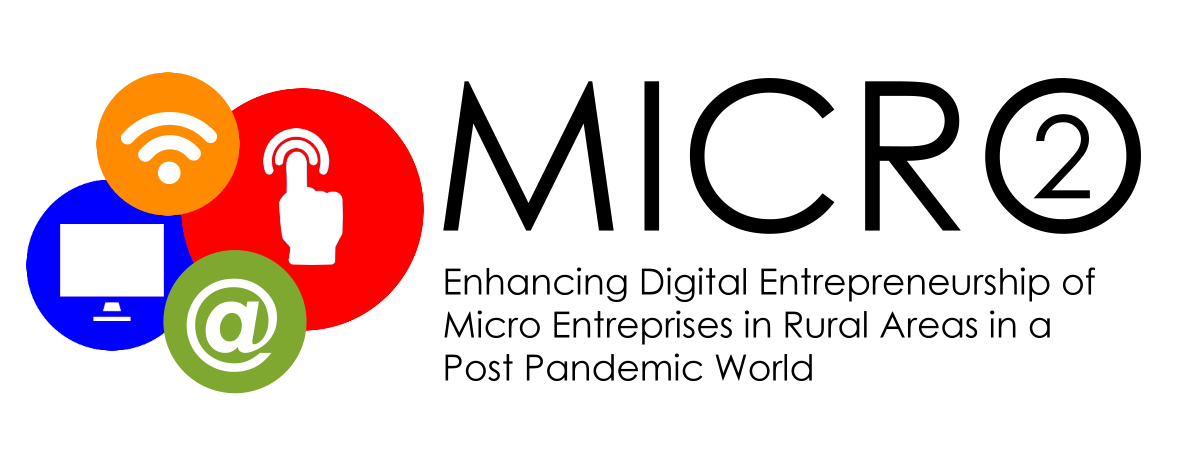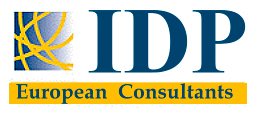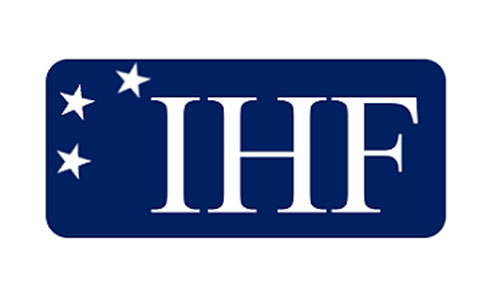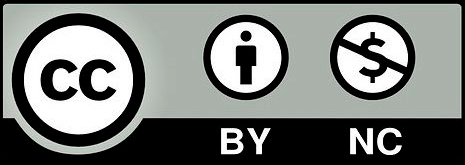Toolkit
MICRO2 toolkit will serve as a knowledge repository where training contents and tools will be accessible and available for a practical application and highly effective upskilling in 3 languanges [EN, ES, ITA]
This know-how container will be flexible and expandable to foster project sustainability.
The training contents will be defined on the basis of the results of Work Package n.2 “MICRO 2 Digital Model”, which will provide a benchmark of DigComp and EntreComp competences for microenterprises in rural areas and will provide the necessary outputs to combine them with the identified topics mentioned above.
Training Paths
Cybersecurity & data management
Cybersecurity Essentials for Rural Micro-Enterprises: Securing digital and business transformation in the post-COVID era
The objectives and goals of this training are: Understand Cybersecurity Fundamentals: Provide a clear understanding of fundamental cybersecurity concepts, terminology, and principles relevant to rural micro-enterprises. Identify Cyber Threats: Educate about common cyber threats such as phishing, malware, ransomware, and social engineering, enabling them to recognize and respond effectively. Enhance Data Protection: Teach strategies to safeguard sensitive business and customer data, emphasizing encryption, access controls, and secure data storage. Secure Digital Transformation: Provide guidance on integrating cybersecurity measures into rural MSME digital transformation efforts to ensure a secure transition. Foster Risk Awareness: Raise awareness about the risks associated with inadequate cybersecurity and the potential consequences for the business, including financial losses and reputational damage. Encourage Employee Training: Stress the importance of ongoing cybersecurity training for all employees to create a culture of security awareness and responsibility. Address Remote Work Security: Provide guidance on securing remote work environments and the use of personal devices to prevent cyber threats.
Effective Data Management Strategies for Rural Microenterprises: Enabling Digital and Business Transformation in the Post-COVID Era
The objectives and goals of this course are: Understand the Importance of Data Management: To educate participants on the significance of effective data management for rural microenterprises, particularly in the context of digital and business transformation after the COVID-19 pandemic. Learn Best Practices for Data Collection and Storage: To provide participants with practical guidance on how to collect, store, and organize data securely and efficiently in rural business settings. Empower Microenterprise Owners: To empower rural microenterprise owners and managers with the knowledge and skills needed to leverage data effectively for business growth and resilience. Enhance Data Literacy: To enhance the data literacy of participants, enabling them to make informed decisions based on data insights and analytics. Boost Business Competitiveness: To equip rural microenterprises with data management strategies that enhance their competitiveness in the post-COVID digital landscape. Facilitate Digital Transformation: To facilitate the digital transformation of rural microenterprises by integrating data-driven practices and adopting suitable digital technologies.
Digital marketing and digital communication
Digital Dynamo: Unleashing the Power of Digital Marketing
At the end of this module, you will be able to: DIGITAL MARKETING Understand the core principles and components of digital marketing Explore the functions of a comprehensive digital marketing plan aligned with business objective Implement strategies for lead generation and optimise conversion rates DIGITAL COMMUNICATION AND INTERACTION Comprehend the role of digital communication in marketing and brand building Choose the right social media platforms and tailor strategies accordingly Develop and implement effective editorial plans for content strategy
E-commerce
Introduction to E-Business for Microenterprises: E-Commerce and Online Sales
At the end of this module, you will be able to: E-COMMERCE Understand the basics of e-commerce, including key concepts, terms and principles Navigate the e-commerce landscape, form analysing opportunities to tips for a strategy ONLINE STORE Choose the ideal e-commerce platform for your business, also considering the differences between B2B and B2C operations Make informed decisions about specific activities for an online store ONLINE SALES Operationalise your business from strategy and first decisions to online sales operations Implement targeted strategies, such as CRM and data analytics, to optimise sales and conversions, effectively adapt to changing market, and expand your online presence
Managment in virtual settings
Leading and Managing Rural Micro Enterprises Through Digital Change
That participants be equipped with a clear understanding of approaches to leading rural microenterprises That participants appreciate the need for planning and structure in implementing digital change in a rural micro enterprise
Hybrid Work Teams for Rural Micro Enterprises
That participants appreciate the challenges and opportunities of hybrid work for rural micro enterprises That participants are equipped with the knowledge and skills necessary to develop a rural micro enterprise hybrid work team model
Case Study
Lough Ree Access for all
Lough Ree Access For All boat is a social enterprise that provides an adapted integrated water-based experience for people with disabilities for the first time. It is the only provider of a licenced passenger boat service for people with disability in Ireland or the UK and is located in rural Ballyleague, County Roscommon in Ireland. In operation since May 2021, the service has already provided access to the Waters of Lough Ree to thousands of people with disabilities from Ireland, the UK and beyond. Given the remote rural location of Ballyleague, digital entrepreneurship has been essential to its success. Without the internet, this service in this location, (well removed from the popular tourist trail) simply couldn’t have connected with its international market by any other means. A strong social presence, combined with an-up-to-date interactive website with online booking provision has proven essential to the operation of the business. Access to Digital Entrepreneurship training as part of wider Social Enterprise Development and Tourism training delivered through Springboard+ funded programmes which were delivered locally has been of great assistance to the centres development.
Glenkeen Farm
Glenkeen Farm spread over 5,500 areas is located in Connemara an EU area of Special designation for conservation on the West Coast of Ireland ‘Wild Atlantic Way’ tourist trail. Glenkeen Farm is a sheep farm micro enterprise open to visitors which allows guests to experience the workings of a typical Irish Sheep farm. The farm boasts a Café and craft shop. 12 different kinds of experiences are available, from sheep shearing and wool spinning demonstrations to sheep herding and wool dying, traditional turf cutting, guided historical walks focusing on the Great famine, or traditional Irish singing and dancing. 55,000 visitors are welcomed every year with a large percentage coming from overseas. In 2017 Catherine O’Grady, the owner and manager of this small family business took part in the Empower Programme an education and training intervention to increase the numbers of female entrepreneurs in the West of Ireland through peer-to-peer learning, coaching and mentoring by industry experts. Online marketing was a significant aspect of this 12-week programme. The programme was delivered through blending learning involving both online and in person sessions. Networking with other similar female business owners is a very important dimension. Catherine credits the programme with providing access to experts in every field of business including Digital Entrepreneurship and says the mentoring sessions were a major boost to the business operation. The programme has provided her with a network of other entrepreneurs she can call on for support. The free programme was jointly funded by the Irish Government and the ESF, Employment Inclusion and Learning Fund. It is offered by the Atlantic Technical University Innovation Hub which opened in 2005 to offer incubation supports such as office space, research, education and training as well as networking and collaborative opportunities to start-up businesses in the local area. Digital Entrepreneurship is an essential fixture of this very remote rural micro-enterprise. Online Marketing has made it possible for this traditional Irish sheep farm to diversify most effectively and in doing so provide the visitor with a most unique Irish Rural Tourism experience.
La Chinata
"La Chinata," a small olive oil company based in the townof Plasencia in the province of Cáceres, Extremadura. La Chinata produces high-quality, extra-virgin olive oilusing traditional methods and has been in operation since1932. In recent years, the company has embraced digitaltechnology to improve its operations and reach newcustomers. La Chinata has used digital technologies to create an e-commerce website (https://lachinata.es/) that allowscustomers to order their products online. This has helpedthe company expand its customer base beyond the localarea and reach customers all over Spain and eveninternationally. La Chinata has also leveraged social media platforms suchas Facebook (https://www.facebook.com/lachinata) andInstagram to promote its products and engage newcustomers. By sharing photos and videos of its productsand the olive oil production process, the company hasbeen able to build a loyal following and generate buzzaround its brand. Furthermore, La Chinata has implemented a digitalquality control system that allows them to track theproduction process from the olive groves to the finalproduct, ensuring that their olive oil meets the highestquality standards. This system uses digital tools to track and monitor eachstep of the production process, from the cultivation of theolives to the bottling of the finished product. Here are some key features of La Chinata's digital qualitycontrol system: 1) GPS tracking: La Chinata uses GPS technology to trackthe location and movement of its olive harvesters. Thisallows the company to monitor the quality and quantity ofthe olives being harvested, and ensure that they are beingpicked at the right time and under the right conditions. 2)Real-time data collection: The company uses digitaltools to collect real-time data about the productionprocess, including the temperature and humidity levelsduring olive storage and the milling process. This data isthen used to optimize the production process and ensurethat the final product is of the highest quality. 3)Quality analysis: La Chinata's quality control systemincludes regular analysis of the olive oil at different stagesof production to ensure that it meets the highest qualitystandards. The company uses a range of digital tools toperform this analysis, including spectrophotometers andgas chromatographs. 4)Traceability: La Chinata's digital quality control systemallows the company to track each batch of olive oil fromthe moment the olives are harvested to the final product.This ensures that the company can quickly identify anyquality issues and take corrective action.
Epicode: A Successful Case Study of Digitalisation in a Microenterprise
Epicode, an EdTech startup in the field of education and technology, emerged as a remarkable case study of digitalisation in a microenterprise. Born during the peak of the pandemic in 2020, Epicode aimed to revolutionize the world of coding and digital professions. By offering remote courses and masterclasses, as well as facilitating job placements for its students, Epicode quickly gained traction in the market. When Epicode approached Secret Key, a digital marketing agency, they faced significant challenges. As a newly established brand without any marketing or business metrics, Epicode needed to validate its business model, generate key lead generation and client acquisition metrics, and convert leads into enrolled students. The agency recognised the immense potential of Epicode and quickly developed a marketing plan and funnel to generate the minimum required course enrolments. Through a comprehensive approach rooted in analysis, strategy, and marketing data-driven methods, Secret Key implemented various activities to achieve the desired outcomes. They optimised landing pages for higher conversion rates, developed captivating creatives, executed paid advertising campaigns on platforms like Google Search, Facebook, and Instagram, and utilised email marketing automation for lead nurturing. The integration of business intelligence with the sales CRM enabled monitoring of the customer journey from end to end. The initial focus was on validating the angles of paid advertising campaigns and optimising the user interface and user experience (UI/UX) of landing pages. Secret Key conducted numerous experiments and extensive user interaction analysis to identify the most effective pain points, gains, keywords, lead acquisition strategies, and demographic characteristics. In just a few weeks, Epicode witnessed exceptional results, with a substantial volume of enrolment requests and sold-out classes. With the impressive outcomes achieved within a short period, Epicode garnered significant market interest. Within months of its inception, 30 prominent Italian angel investors subscribed to a 1 million Euro investment round, further validating the company's success. The collaboration between Epicode's internal marketing team and Secret Key facilitated continuous improvement in various aspects of brand communication, including advanced data modeling, new ad creatives, valuable lead magnets, enhanced storytelling on social media, and content production for SEO and lead acquisition purposes. The scaling phase involved increasing the budget for paid advertising, expanding advertising channels, and utilising offline conversions for more potent campaign performance analysis. With meticulous scaling strategies, Epicode managed to maintain excellent lead performance metrics, acquire more leads of higher quality, and achieve sustainable cost per acquisition rates. The combined efforts of the product, marketing, and sales teams enabled Epicode to secure a second substantial investment round, further propelling their national and international market expansion plans.
Keyless: Revolutionizing Biometric Authentication for Digital Trust and Safety
Keyless is a cybersecurity company that has developed ground-breaking technology for password less biometric recognition, enabling employees of banks and businesses to securely access their accounts. In November 2020, the start-up was acquired by Sift, a global leader in digital trust and safety solutions. Founded just four years ago, Keyless quickly made a name for itself as a provider of next-generation biometric authentication. The company’s acquisition by Sift, backed by prominent venture capital firms, solidified its position in the digital trust and safety industry. Keyless addresses the need to protect businesses from fraud and enhance the user experience by offering innovative solutions for digital identity. Its technology ensures the privacy and security of highly regulated organisations, such as banks and schools, allowing them to authenticate users without compromising personal data. With a team of Italian founders and a strong international presence, Keyless has gained recognition and secured partnerships with major enterprises across Europe. The company's success stems from its ability to combine multi-modal biometrics, privacy-enhancing technologies, and a distributed cloud network. By winning prestigious contests and securing funding rounds, Keyless has demonstrated its potential to revolutionize the cybersecurity landscape. It has become the go-to solution for organizations seeking advanced protection against phishing attacks, credential theft, and account takeovers. Keyless' vision is to create a world where individuals can seamlessly access digital services from any device while maintaining control over their personal credentials. With their cutting-edge technology and strategic partnerships, they are at the forefront of the password less authentication revolution, ensuring a secure and user-friendly online experience for businesses and individuals alike.
Empowering Construction Industry with Industry 4.0 Solutions: A Case Study of Skills Software GmbH
Skill Software GmbH is a German micro-SME that has been at the forefront of developing digital solutions for businesses since its establishment in 1991. With a dedicated team of 8 employees, the company specialises in software development and distribution, specifically catering to B2B customers using a cloud server database. Their primary focus lies within the construction industry, where they offer a range of Industry 4.0 solutions designed to streamline operations and enhance efficiency. One of their flagship offerings is Customer Relations Management (CRM) technology, which enables digital support for customer acquisition and management. Additionally, Skill Software provides a suite of specialised tools tailored to the unique needs of the construction industry. This includes BauDoc, a comprehensive solution for construction management control and documentation tasks, EnergyDoc, which utilises mobile energy management software with integrated sensors and alarm functions to drive energy savings, TechDoc, a platform for delivering critical technical information to mobile devices, and PropertyDoc, a comprehensive tool that combines all these solutions seamlessly. Skill Software actively participates in the DigitaliseSME initiative, where they not only benefit from the programme but also serve as Digital Enablers for other SMEs. This involvement has been instrumental in their expansion into the Eastern European B2B market, and they have ambitious plans for further expansion into the Netherlands and the UK. To support their growth and innovation, Skill Software has received funding from various such as the innovation fund administered by the German State of Hesse, as well as EU regional funds and the 'KMU Innovativ' funding initiative of the German Federal Ministry of Education and Research. These funding opportunities have allowed Skill Software to fuel their digital innovations and drive their mission of transforming businesses through technology. Membership in prominent B2B networks and clusters in Germany, such as BVMW, has been a valuable asset to Skill Software. Additionally, their collaborative partnerships with universities have played a pivotal role in their success, enabling them to stay at the forefront of technological advancements and access cutting-edge research and development. Skill Software GmbH exemplifies the importance of both financial and technical support in enabling MSMEs to thrive in the digital era. Their innovation and commitment to digital transformation have empowered businesses within the construction industry and beyond, streamlining operations and driving efficiency in the ever-evolving landscape of Industry 4.0.
Revolutionizing Agriculture through Digital Transformation: The Success Story of Van Den Borne Aardappelen
Van Den Borne Aardappelen, a farm that originated in 1952 as a traditional family farm, has emerged as a pioneering example of digital transformation in the Netherlands. Focusing on the cultivation of potatoes, maize, wheat, and sugar beet, the Van Den Borne brothers have embraced advanced digital technologies to revolutionize their farming practices. By harnessing crop monitoring tools and software, they access real-time data and insights, enabling them to make informed decisions regarding irrigation and fertilizer usage. Precision farming technologies, including GPS drones and sensors, have played a pivotal role in their success, allowing them to significantly increase crop yields, reduce inputs such as water, fertilizers, and fuel, and ultimately boost revenue. The Van Den Borne brothers’ journey towards digital advancement involved extensive experimentation and scaling of successful solutions. They conducted initial trials and use cases to identify the most effective techniques before implementing them on a larger scale. Collaboration with knowledge institutions and industry partners, combined with active participation in publicly supported research and innovation projects, has been instrumental in driving their digital transformation forward. Public financial support from local, regional, and national programmes aimed at stimulating MSME innovation and rural economic development has greatly facilitated the progress of Van Den Borne farm. Notably, they have received financial backing from initiatives like the Noord-Brabant subsidy scheme for MSME innovation stimulation. Furthermore, the farm has obtained funding for precision farming equipment investments through the Precision Farming Programme. The remarkable digital transformation achieved by the Van Den Borne farm underscores the significance of guidance and training programmes, rigorous technology testing, and the vital role played by Digital Innovation Hubs. Through the optimisation of their potato production using digital instruments, such as Precision Farming, Jacob van den Borne and his team have demonstrated the immense potential and tangible benefits of embracing advanced digital technologies in agriculture.
Transforming Warehouse Logistics with Customised Dolibarr ERP Solutions: A Case Study of Z-Application
Z-Application, a Belgian micro-SME established in 2013, specialises in providing web-based client and server solutions for warehouses and customised warehouse logistics solutions. Z-Application offers tailored development of open-source Dolibarr Enterprise Resource Planning (ERP) software solutions. Appels developed a modular base product that eliminates the need for individual business solutions for each customer, making it easier to customise according to specific business needs. With a diverse customer base spanning Europe, the USA, Mexico, and South Africa, Z-Application has gained recognition and support from various initiatives such as the Flemish SME e-wallet training support scheme and the DigitaliseSME initiative. Through the guidance of a Digital Enabler, Z-Application significantly enhanced the automation of its online sales and successfully developed a new website integrated with a Search Engine Optimization (SEO) tool. This achievement underscores the importance of targeted guidance and mentoring programmes like DigitaliseSME in fostering success for enterprises. Z-Application focuses on supporting companies with the development and maintenance of the Dolibarr ERP system. Their expertise lies in automated stock management and custom Dolibarr ERP development. For the development of business-oriented applications, Z-Application employs web-based client-server solutions, utilizing JavaScript/HTML5/CSS3 for the user interface. Z-Application’s approach revolves around a ready-to-use modular base product, which eliminates the need for building independent business solutions for each client. The base product leverages the open-source ERP system Dolibarr as a business platform. Dolibarr was selected due to its ease of management, installation on various platforms, and comprehensive set of standard features essential for businesses. Continuous improvement and expansion of the base product with new features are integral to Z-Application’s support strategy. They also offer development and support services for the Dolibarr ERP system, ensuring ongoing assistance to their clients.
Best Practice
Skillnets Ireland
Skillnet Ireland is a business support agency of the Government of Ireland, responsible for advancing the competitiveness, productivity and innovation of Irish businesses through enterprise-led workforce development. Its budget for the current year is xxx and there is a match funding requirement from member enterprises of 40%. Through 70 plus Skillnet Business Networks it helps prepare over 22,300 businesses (86,500 workers) for the future of work each year. Preparation for Digitisation is a clear priority There are six rural themed Skillnet Networks which provide part time Digital Entrepreneurship and other Training: ICOS Skillnet for companies of all sizes in the co-operative and agri-business sectors. National Organic Training Skillnet is a business network for companies of all sizes in the organic sector. Rural Enterprise Skillnet is a multi-sector business network for companies of all sizes in the North West. Rural Food Skillnet Rural Food Skillnet is a business network for companies of all sizes in the food and hospitality sector Nationwide. Farm Business Skillnet Farm Business Skillnet is a business network of farm businesses and smallholders in the agri sector Macra Agricultural Skillnet Macra Agricultural Skillnet is a business network for farmers and the agribusiness sector. While these networks do not exclusively serve rural Micro-enterprises but they are dominated by the sector. All networks have a significant degree of independence in their programme offering and digital entrepreneurship training is strongly evident in their course offering. Through MentorsWork, Skillnet Ireland offer a 12 week individualised Mentoring programme for member companies. There are four Pillars covering People, Finance & Growth, Business Processes and Digital & Automation. This pillar covers aspects relating to internal and external digital transformation of the business and includes moving the business online, marketing, building online communities, and automating day to day tasks.
Roscommon Leader Partnership Social Enterprise Training & Mentoring Support Project
Roscommon Leader Partnership is one of 48 not for profit Local Development Companies (LDCs) that deliver community and rural development, labour market activation, social inclusion, climate action and social enterprise services across Ireland. It delivers a range of state and EU funded social activation and community development programmes such as SICAP, Smart Villages and Leader. Support, both financial and capacity building is available for Micro enterprises primarily through the EU Leader Programme as well as the SICPA programme. The Partnership has now established the Social Enterprise Training & Mentoring Support Project to build the capacity of both new and existing Social Enterprise groups in this rural county. Emerging and established social enterprises are supported. A full range of training covering every aspect of social enterprise development is provided together with mentoring support. Specific Training and support in idea generation, governance, branding, marketing including online and social media marketing, accessing funding and finance, Human Resources and Employment Law, scaling up, Revenue Generation Supports, Risk Management, Equality and Ability Awareness, Data Protection and Bookkeeping is provided. Training is also supported by mentor guidance. A full time Community Development and Social Enterprise officer has also now been appointed by the Community to support the sector in the County.
Cervezas Alpujarra
"Cervezas Alpujarra," a small craft beer brewery located inthe province of Granada. The Alpujarra is a region locatedin the south of Spain, in Andalusia. It is located betweenthe provinces of Granada and Almería. Due to its geographical location between the SierraNevada, Sierra de Lújar, Sierra de la Contraviesa, Sierra deGádor, the Mediterranean coast and the valleys of therivers Guadalfeo and Andarax, Alpujarra is considered arural area. Most of these products are made usingtraditional methods and natural products. Such is thecase of cheeses, chocolates, jams, wines, hams and manyothers. Cervezas Alpujarra produces high-quality, artisanal craftbeer using traditional methods and locally sourcedingredients. In recent years, the company has embraced digital technology to improve its operations and reachnew customers. Cervezas Alpujarra created an e-commerce website ‘Latienda de Alpujarra’(https://latiendadelaalpujarra.com/tienda/) where clientscan buy products online (not only craft beers). This hashelped the company expand its customer base beyond thelocal area and reach customers all over Spain and eveninternationally. This ensures that the company can quickly identify anyquality issues and take corrective action. Furthermore, in ‘La Tienda de la Alpujarra’ Aurelio,Celestino and Jorge offer a careful selection of the mostrepresentative products of the Alpujarra. Wine, cheese, oil,sausages, honey, jam, marmalade, beer... and of coursethe best known of all, ham. La tienda de la Alpujarra has also leveraged social mediaplatforms such as Facebook and Instagram to promoteits products and engage with customers. By sharingphotos and videos of its products and the beer brewingprocess, the company has been able to build a loyalfollowing and generate buzz around its brand. Overall, Cervezas Alpujarra is a great example of how arural micro enterprise can successfully leverage digitaltechnology to improve its operations, expand its reach,and build a strong brand presence in the digital space.
Bodegas Robles
One innovative rural enterprise in Andalucia, Spain is"Bodegas Robles," a winery located in the province ofCórdoba (Andalucia) that has implemented sustainableand eco-friendly practices in their wine productionprocess. The Robles family has been making wine in Montilla since1927. At the end of the 1990s, the third generationunderstood that, rather than progress, the company was infavour of going back. And this philosophy is perfectlyreflected in the work we do in our Montilla Moriles winecellar. The company was awarded with the Top15 award for theBest Spanish Wineries of the Decade (2011-2020) by theSpanish Association of Wine Journalists and Writers (Aepev). Bodegas Robles uses an innovative system called"photovoltaic roofs" that generate clean energy fromsolar panels installed on the roof of their winery. They alsouse organic and biodynamic farming methods to growtheir grapes, avoiding the use of chemical fertilizers andpesticides. In addition to their sustainable practices, Bodegas Robleshas developed a unique and innovative wine-makingprocess called "soleo, " which involves drying the grapesin the sun to concentrate their flavor and sugar contentbefore pressing. This process results in a wine that is more full-bodied andflavorful than traditional wines, and has earned BodegasRobles several international awards and recognitions. Bodegas Robles' innovative practices show how ruralenterprises can embrace sustainability and eco-friendliness while also experimenting with new andunique production methods to create high-quality anddistinctive products. This approach can help ruralbusinesses differentiate themselves in a crowded marketand appeal to consumers who are increasingly interestedin sustainable and ethical products.
Confartigianato Imprese: Driving Digital Transformation for Artisans and MSMEs
Confartigianato Imprese, the leading association serving artisans and small businesses in Italy, has embarked on a transformative journey to support its members’ digitalisation efforts. Leveraging the momentum created by the government’s “Enterprise 4.0” initiative, Confartigianato Imprese has developed a comprehensive programme that encompasses information, education, and services tailored to the needs of its members. Under the guidance of a newly appointed delegate for Digital Affairs and a dedicated Steering Committee comprising artisans and own staff, the association has established an online portal as a centralised hub for valuable resources and initiatives. A key element of this programme is the establishment of a nationwide network of Digital Innovation Hubs (DIHs). These DIHs serve as primary contact points for MSMEs seeking guidance, information, and advice on digital transformation and the incentives by “Enterprise 4.0.” Local experts at these DIHs provide tailored advice and facilitate access to competencies and solutions. An exemplary illustration of this initiative is Confartigianato Varese - ASARVA, which three years ago launched “Faberlab” within its premises. Faberlab has played a vital role in providing education on various aspects of digital transformation, with a special emphasis on digital fabrication, benefitting both schools and companies. In addition to local and regional hubs, Confartigianato’s local offices offer direct assistance in areas such as e-commerce, customised digital transformation courses, and the development of educational materials. Moreover, Confartigianato has collaborated with esteemed institutions to produce targeted guides for local associations and members, including practical guides to Industry 4.0 compliance and implementation. Furthermore, a national roadshow comprising over 50 public events continues to raise awareness about the benefits of “Enterprise 4.0” and digital transformation at the local level. Confartigianato Imprese actively engages with institutional actors and bodies to ensure that the needs of MSMEs are accurately addressed in shaping digitalization policies and utilizing public resources effectively. With its extensive network, comprehensive services, and collaborative approach, Confartigianato Imprese stands as a reliable and influential partner, empowering artisans and small business owners throughout their digitalisation journey.
Espressoh: Empowering Clean Beauty Through Digital Excellence
Espressoh is a trailblasing clean beauty brand that epitomises the convergence of Italian craftsmanship and digital innovation. With a steadfast commitment to simplicity, authenticity, and ethical beauty, Espressoh has harnessed the power of digital platforms, e-commerce, and social media to redefine the clean beauty landscape. Founded in 2018 by Chiara Cascella, Espressoh emerged as a beacon of clean beauty, offering a range of makeup products that are 100% made in Italy and free from cruelty and toxins. From the outset, the brand recognised the transformative potential of digital channels and strategically embraced them to propel its mission forward. At the core of Espressoh’s success lies its adept utilisation of social media platforms to build a robust online community. By leveraging the power of platforms such as Instagram, Facebook, and YouTube, Espressoh has cultivated a loyal following of beauty enthusiasts who actively engage with the brand's captivating content and participate in interactive campaigns. Espressoh's e-commerce platform serves as a seamless gateway for customers to explore and purchase its clean beauty products. By prioritizing digital commerce over physical stores, Espressoh provides customers with a convenient and personalized shopping experience. Through strategic digital marketing campaigns, including targeted advertisements and influencer collaborations, Espressoh has garnered widespread attention and achieved remarkable growth in its online sales. Espressoh’s success story serves as a testament to the transformative power of digitalization and its ability to amplify the reach and impact of a microenterprise. By leveraging digital channels, Espressoh has not only connected directly with its target audience but has also fostered an inclusive and engaging beauty community that transcends geographical boundaries. As a good practice in the realm of clean beauty, Espressoh showcases the potential for microenterprises to thrive in the digital age. By embracing digital platforms, e-commerce, and social media, Espressoh has not only elevated its brand presence but has also effectively communicated its core values of authenticity and ethical beauty to a global audience.
CPME: Empowering Digital Transformation for Micro, Small and Medium-sized Enterprises
CPME (Confederation of MSMEs) is an influential employers’ organisation in France, representing a wide range of sectors including industry, services, trade, crafts, and liberal professions. With its extensive network of 110 federations and 117 territorial unions, CPME operates at both national and international levels as a social partner, advocating for the interests of micro, small and medium-sized enterprises. The organisation is committed to voicing the values and uniqueness of MSMEs, which include the commitment and risk-taking of entrepreneurs, the close proximity of MSMEs to their local communities, the solidarity within companies, and their dynamic and forward-thinking nature. At the European level, CPME maintains a representative office in Brussels, enabling direct engagement with European institutions on economic, social, and environmental policies affecting MSMEs. It actively monitors EU policy and legislative processes, informs members about relevant EU policies, and engages in lobbying efforts with the European Parliament. CPME also participates in European projects, fostering collaboration and knowledge exchange. CPME is dedicated to supporting its members’ digitalisation efforts, providing a range of resources and initiatives. It offers online tools such as EvalNumPME, a self-diagnosis tool for assessing digital maturity, and contributes to the platform www.cybermalveillance.gouv.fr, which promotes cybersecurity awareness. The organisation collaborates with various partners and institutions, such as EducNum and France NUM, to educate young people about digitalization and facilitate the digital transformation of MSMEs. Internally, CPME has established specific forums and working groups focused on digital transition, cybersecurity, and start-ups. It publishes handbooks and guides on topics such as telecom selection, best practices in digitalisation, and GDPR compliance. CPME organises events, partners with projects and awareness initiatives, and supports campaigns targeting MSMEs. Notably, it hosts the “Digital Trophies” competition, recognising traditional MSMEs that effectively utilize digital tools. CPME’s comprehensive approach highlights its commitment to empowering MSMEs in embracing digitalisation. By providing guidance, resources, and advocacy, CPME plays a vital role in shaping the digital landscape for micro, small and medium-sized enterprises in France.
Sylvestris
Sylvestris has developed an online platform that allows consumers to purchase organic honey directly from small-scale beekeepers in the province of the rural city of Jaén (Andalucía). The company also provide information about the beekeepers and the production process, allowing consumers to make informed decisions about the honey they purchase. The company was founded in 2016 by a group of entrepreneurs with a shared passion for sustainability and environmental preservation. In addition to their online platform, Sylvestris has also created a mobile application that provides beekeepers with real-time information about the weather, pollen production, and other factors that affect honey production. This data helps beekeepers optimize their production process and ensure the quality of their honey. Sylvestris' innovative use of digital technology helps to promote sustainable and ethical beekeeping practices while also creating a market for small-scale beekeepers to sell their products. By leveraging digital platforms and tools, Sylvestris is able to connect consumers with local producers, while also creating value for beekeepers and promoting sustainable agriculture practices in the rural areas of Andalucia. The Sylvestris app also provides information about pollen production, which is another important factor that affects honey production. The app provides real-time data on pollen counts, helping beekeepers to optimize their hives and ensure that their bees have access to the best possible food sources. In addition to these features, the Sylvestris app also provides information about beekeeping techniques and best practices. The app includes a library of educational resources, including videos and articles, that can help beekeepers improve their skills and knowledge. The mobile application is important because weather conditions can greatly affect honey production, and beekeepers need to be able to adapt their practices accordingly. The app provides real-time information about temperature, humidity, wind speed, and other weather factors, allowing beekeepers to make informed decisions about when to harvest their honey. One of Sylvestris' key objectives is to promote sustainable beekeeping practices that help to protect the environment and ensure the long-term viability of honey production. To this end, the company provides training and support to local beekeepers, helping them to adopt sustainable farming practices and improve the quality of their honey. Overall, Sylvestris is an innovative digital rural enterprise that is helping to promote sustainable and ethical beekeeping practices in Andalucia while creating a market for local beekeepers to sell their products. Through their online platform and educational initiatives, the company is helping to raise awareness about the importance of environmental preservation and sustainability in rural areas.










